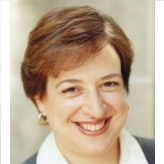Officials
Back to Officials


Offical

Name: Kagan, Elena
Current Position: Previous Solicitor General
Elena Kagan, the first woman to serve as solicitor general, was sworn in on March 20, 2009. She brings with her a reputation for defending civil liberties while also asserting the power of the presidency. Her nomination stirred mild controversy because the solicitor general represents the U.S. government before the Supreme Court and appeals courts, and Kagan has never argued a case before the Supreme Court.
Kagan was born on Manhattan’s Upper West Side on April 28, 1960. Her father was a lawyer and her mother was an elementary school teacher. Kagan graduated from Hunter College High School in 1977, and then attended Princeton, where she received her bachelor’s degree in history, summa cum laude, in 1981. She was awarded Princeton’s Daniel M. Sachs Graduating Fellowship, which allowed her to attend Worcester College, Oxford, receiving an M. Phil. in 1983.
She then attended Harvard Law School, where she was supervising editor of the Harvard Law Review and graduated magna cum laude in 1986. Following law school, Kagan clerked for Judge Abner Mikva of the US Court of Appeals for the District of Columbia Circuit (1986-1987) and for US Supreme Court Justice Thurgood Marshall (1987-1988), who was himself Solicitor General before President Lyndon Johnson appointed him to the Supreme Court.
In 1989, Kagan joined the Washington, DC, law firm of Williams & Connolly as a litigator. She spent two years there before beginning her academic career at the University of Chicago Law School in 1991, teaching alongside Barack Obama. Kagan became a tenured professor of law in 1995.
That same year, she was selected by President Bill Clinton to serve as associate White House counsel. In 1996, she became Deputy Assistant to the President for Domestic Policy, and in 1997, Kagan was selected as deputy director of the Domestic Policy Council. In these positions she helped formulate and implement White House policy in areas ranging from education to crime to public health.
On June 17, 1999, President Clinton nominated Kagan to the US Court of Appeals for the District of Columbia Circuit. Republicans, who controlled the Senate, balked at Kagan’s nomination and refused to convene a confirmation hearing.
She then left Washington and joined the faculty of Harvard Law School as a visiting professor in 1999. She was made a full professor in 2001. Kagan taught administrative law, constitutional law and civil procedure, and seminars on separation of powers and the First Amendment.
In 2001, she published the article, “Presidential Administration,” in the Harvard Law Review, which defended the Clinton administration’s assertion of the right to direct federal regulatory agencies without Congressional or court involvement. The article was honored as the year’s top scholarly article by the American Bar Association’s Section on Administrative Law and Regulatory Practice.
In 2003, controversial Harvard President Lawrence Summers (now Barack Obama’s director of the National Economic Counsel) appointed Kagan dean of Harvard Law School, making her the first woman ever to lead the law school. During her time as dean (which included the Charles Hamilton Houston professorship), she oversaw a capital campaign that eventually raised a school record $476 million and instituted a number of changes to bolster the school’s sagging reputation. She hired prestigious, and sometimes controversial, new faculty members, including Jack Goldsmith, who worked in the Bush White House and was rumored to have helped author the now infamous “torture memos.” Kagan also revamped the school’s core curriculum and instituted small, student-friendly changes, like offering free coffee in classroom buildings.
Getting to Know Elena Kagan (New Republic)
A Peek at SG Nominee Kagan’s Law School Transcript, Recommendations (by Tony Mauro, Legal Times)
Harvard Law, Hoping Students Will Consider Public Service, Offers Tuition Break (by Jonathan D. Glater, New York Times)
Big plans highlight Elena Kagan's 2L (by Beth Potier, Harvard University Gazette)
At the HLS Helm (Harvard Magazine)
- Latest News
- D.C. Public Schools will Teach all Second-Graders to Ride a Bike
- New Rule in Germany Limits Sales of Sex-Themed E-Books to 10pm to 6am
- What Happened to the 6-Year-Old Tibetan Boy the Chinese Government Kidnapped 20 Years Ago?
- U.S. Ambassador to Turkey Photoshops his Hair Color to Mock Turkish Mayor
- Mystery Artist Calls Attention to Unfixed Potholes by Drawing Penises around Them




